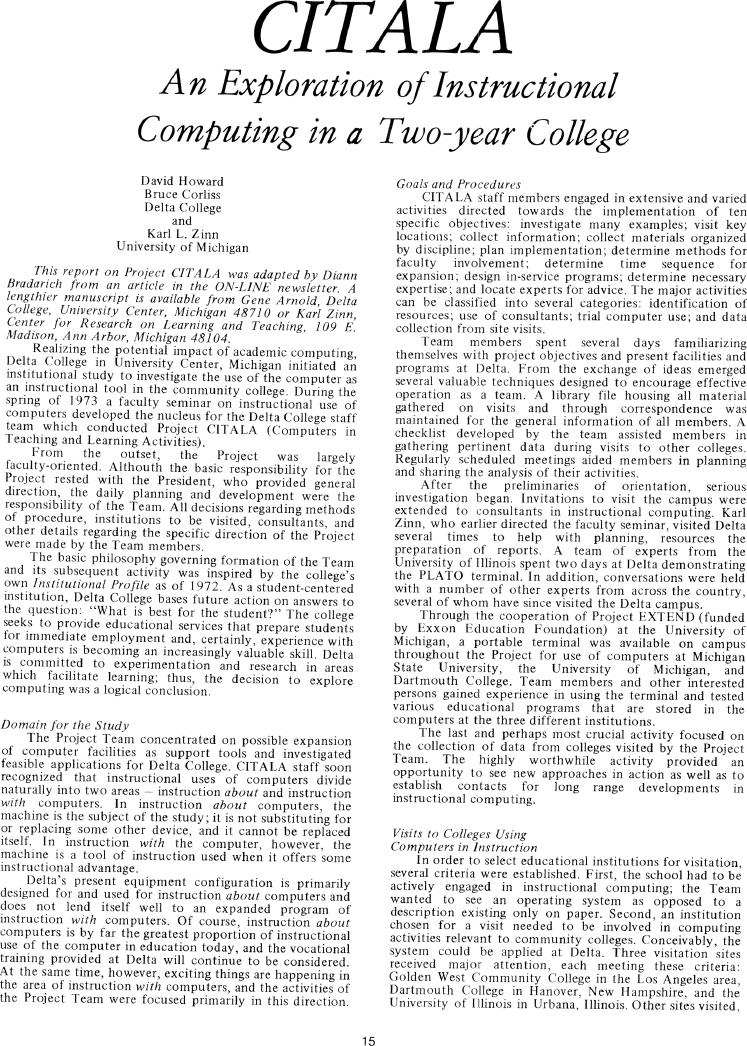The Best of Creative Computing Volume 1 (published 1976)
CITALA (An Exploration of Instructional Computing in a Two-Year College)

CITALA
An Exploration of Instructional Computing in a Two-year College
David Howard
Bruce Corliss
Delta College
and
Karl L. Zinn
University of Michigan
This report on Project CITALA was adapted by Diann Bradarich from an article in
the ON-LINE newsletter. A lengthier manuscript is available from Gene Arnold,
Delta College, University Center, Michigan 48710 or Karl Zinn, Center for
Research on Learning and Teaching, 109 E. Madison, Ann Arbor, Michigan 48104.
Realizing the potential impact of academic computing, Delta College in
University Center, Michigan initiated an institutional study to investigate the
use of the computer as an instructional tool in the community college. During
the spring of 1973 a faculty seminar on instructional use of computers developed
the nucleus for the Delta College staff team which conducted Project CITALA
(Computers in Teaching and Learning Activities).
From the outset, the Project was largely faculty-oriented. Althouth the basic
responsibility for the Project rested with the President, who provided general
direction, the daily planning and development were the responsibility of the
Team. All decisions regarding methods of procedure, institutions to be visited,
consultants, and other details regarding the specific direction of the Project
were made by the Team members.
The basic philosophy governing formation of the Team and its subsequent activity
was inspired by the college's own Institutional Profile as of 1972. As a
student-centered institution, Delta College bases future action on answers to
the question: "What is best for the student?" The college seeks to provide
educational services that prepare students for immediate employment and,
certainly, experience with computers is becoming an increasingly valuable skill.
Delta is committed to experimentation and research in areas which facilitate
learning; thus, the decision to explore computing was a logical conclusion.
***
Domain for the Study
The Project Team concentrated on possible expansion of computer facilities as
support tools and investigated feasible applications for Delta College. CITALA
staff soon recognized that instructional uses of computers divide naturally into
two areas - instruction about and instruction with computers. In instruction
about computers, the machine is the subject of the study; it is not substituting
for or replacing some other device, and it cannot be replaced itself. In
instruction with the computer, however, the machine is a tool of instruction
used when it offers some instructional advantage.
Delta's present equipment configuration is primarily designed for and used for
instruction about computers and does not lend itself well to an expanded program
of instruction with computers. Of course, instruction about computers is by far
the greatest proportion of instructional use of the computer in education today,
and the vocational training provided at Delta will continue to be considered. At
the same time, however, exciting things are happening in the area of instruction
with computers, and the activities of the Project Team were focused primarily in
this direction.
***
Goals and Procedures
CITALA staff members engaged in extensive and varied activities directed towards
the implementation of ten specific objectives: investigate many examples; visit
key locations; collect information; collect materials organized by discipline;
plan implementation; determine methods for faculty involvement; determine time
sequence for expansion; design in-service programs; determine necessary
expertise; and locate experts for advice. The major activities can be classified
into several categories: identification of resources; use of consultants; trial
computer use; and data collection from site visits.
Team members spent several days familiarizing themselves with project objectives
and present facilities and programs at Delta. From the exchange of ideas emerged
several valuable techniques designed to encourage effective operation as a team.
A library file housing all material gathered on visits and through
correspondence was maintained for the general information of all members. A
checklist developed by the team assisted members in gathering pertinent data
during visits to other colleges. Regularly scheduled meetings aided members in
planning and sharing the analysis of their activities.
After the preliminaries of orientation, serious investigation began. Invitations
to visit the campus were extended to consultants in instructional computing.
Karl Zinn, who earlier directed the faculty seminar, visited Delta several times
to help with planning, resources the preparation of reports. A team of experts
from the University of Illinois spent two days at Delta demonstrating the PLATO
terminal. In addition, conversations were held with a number of other experts
from across the country, several of whom have since visited the Delta campus.
Through the cooperation of Project EXTEND (funded by Exxon Education Foundation)
at the University of Michigan, a portable terminal was available on campus
throughout the Project for use of computers at Michigan State University, the
University of Michigan, and Dartmouth College. Team members and other interested
persons gained experience in using the terminal and tested various educational
programs that are stored in the computers at the three different institutions.
The last and perhaps most crucial activity focused on the collection of data
from colleges visited by the Project Team. The highly worthwhile activity
provided an opportunity to see new approaches in action as well as to establish
contacts for long range developments in instructional computing.
***
Visits to Colleges Using Computers in Instruction
In order to select educational institutions for visitation, several criteria
were established. First, the school had to be actively engaged in instructional
computing; the Team wanted to see an operating system as opposed to a
description existing only on paper. Second, an institution chosen for a visit
needed to be involved in computing activities relevant to community colleges.
Conceivably, the system could be applied at Delta. Three visitation sites
received major attention, each meeting these criteria: Golden West Community
College in the Los Angeles area, Dartmouth College in Hanover, New Hampshire,
and the University of Illinois in Urbana, Illinois. Other sites visited,


